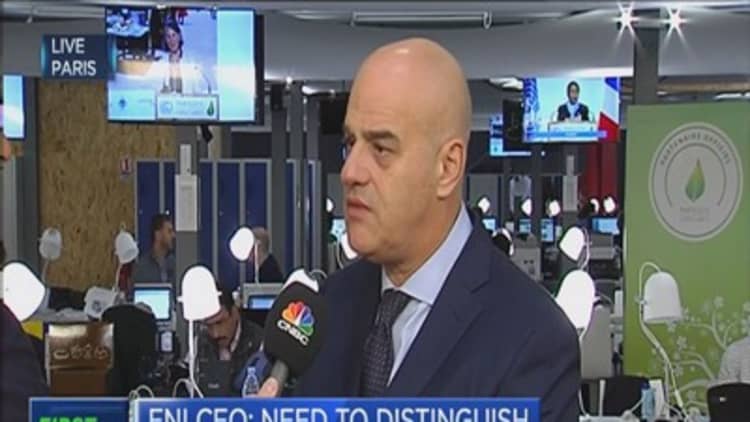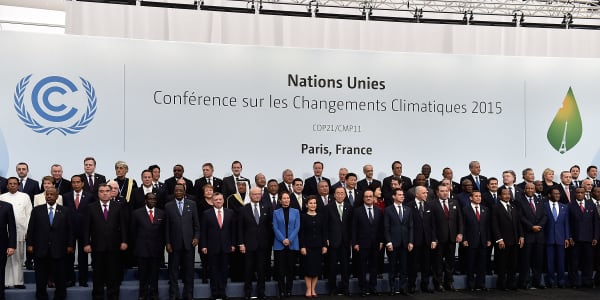
Despite the ongoing weekly closures of U.S. oil rigs, spending cuts and the cancellation of drilling projects in the U.S. shale oil industry amid slumping oil prices, the U.S. energy secretary told CNBC that the country's oil production will recover.
"Oil production in the U.S. has not dramatically dropped, it has gone down a little bit but it's up by four million barrels a day from a few years ago," U.S. Energy Secretary Ernest Moniz told CNBC.
"Our Energy Information Administration (EIA) expects that the average production this year will still be above 9 million barrels a day so the drop-off is not viewed as precipitous. Presumably, the expectations are over time that we'll see a slow reversal of that drop-off and that production will be restored."
"We are certainly not resource limited," Monez added, noting as well that the country's natural gas production was continuing to rise despite lower gas prices. He said the country's first liquefied natural gas (LNG) exports would come onto the market early next year.
Despite Monez' optimism, the oil industry as a whole is experiencing bleak times at the moment, and particularly in the U.S. where shale oil producers who were on a tear a few years ago are now making major cutbacks following the dramatic fall in oil prices over the last 18 months. A barrel of Benchmark Brent crude oil fetched $114 in June 2014; now that barrel costs around $40.
Prices have fallen so steeply due to a glut in supply far exceeding demand. Exacerbating the decline in prices, the Organization of Petroleum-Exporting Countries (OPEC) decided last year to maintain its record production levels despite the fall in prices, in order to maintain its market share in the face of rival U.S. oil producers who have higher production costs.
Read More Cramer: OPEC meeting 'devastating' for US
Oil prices on Friday took another hit after the 12-member OPEC group – led by Saudi Arabia -- met and decided to maintain its strategy, piling further pressure on prices and other global oil producers. Oil prices fell further on Monday, hitting a 7-year low.
Eyes on energy independence
OPEC's actions and the ensuing low oil price have directly impacted the U.S. shale oil industry with rig closures announced week after week. According to oil and gas consultancy WTRG Economics, as of December 5, the total number of North American oil rigs has declined 61.6 percent from a year ago.
WTRG Economics also said in its latest note published last week that, year-over-year, oil exploration in the U.S. is down 64.7 percent and gas exploration is down 44.2 percent.
The so-called "shale oil revolution" in the U.S. had led to hopes that the nation could become energy independent in the coming decades. Speaking to CNBC in Paris, at the United Nations' summit on climate change (COP21), Monez said that the U.S. was working towards that goal.
"I want to remind you that we still import around 7 million barrels a day of crude oil so what the shale revolution in oil has done is dramatically lower our imports. Our net imports are about 4.5 million barrels a day because we're exporting so many oil products now. So on the one hand we are improving our balance of payments, lowering our imports but at the same time, we have never taken our eyes off of reduced oil dependence," he said.
"We are pursuing all the directions for reducing oil dependence," he added.

It's not just the U.S. who must take responsibility for oil's current problems. Society must find "a global solution," the chief executive of Italian energy giant Eni told CNBC.
"The issue here is to have to regulate the oil and gas business in terms of pricing, to be able to invest and to be able to offer to our consumers the right price in the long term," Claudio Descalzi said.
"This energy business is not a short-term business, it's a long-term cycle, a long-term investment. We cannot just look at today or tomorrow, we have to look at the long term."
When it comes to fossil fuels overall, Descalzi said society needed to segregate "good" fossil fuels from the "bad," while insisting on renewables. If investment continues to be reduced at these lower levels, oil prices could spike similar to those in 2008, as supply is impacted, Descalzi added.
"I think this low price will remain for one or a couple of years. I think we will have some peaks and some spikes and some down trends, but it will be in the range of $50–$60, I cannot tell you exactly, but it will be very low, and that is affecting outside investment."
"We have to find a solution. The solution is not just (from) one or two countries. It's a global solution and I think that is a very sensitive, important issue to face."
CNBC's Alexandra Gibbs contributed to this report.
- By CNBC's Holly Ellyatt, follow her on Twitter @HollyEllyatt. Follow us on Twitter: @CNBCWorld






